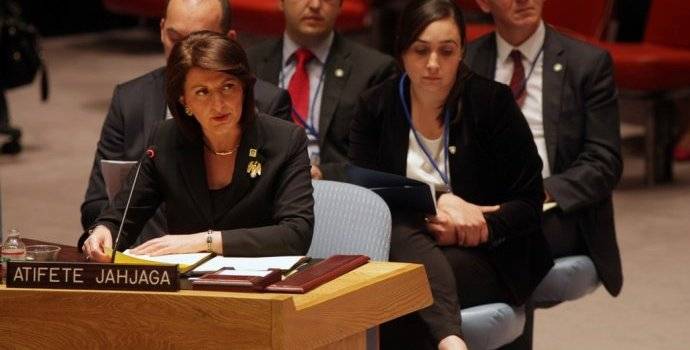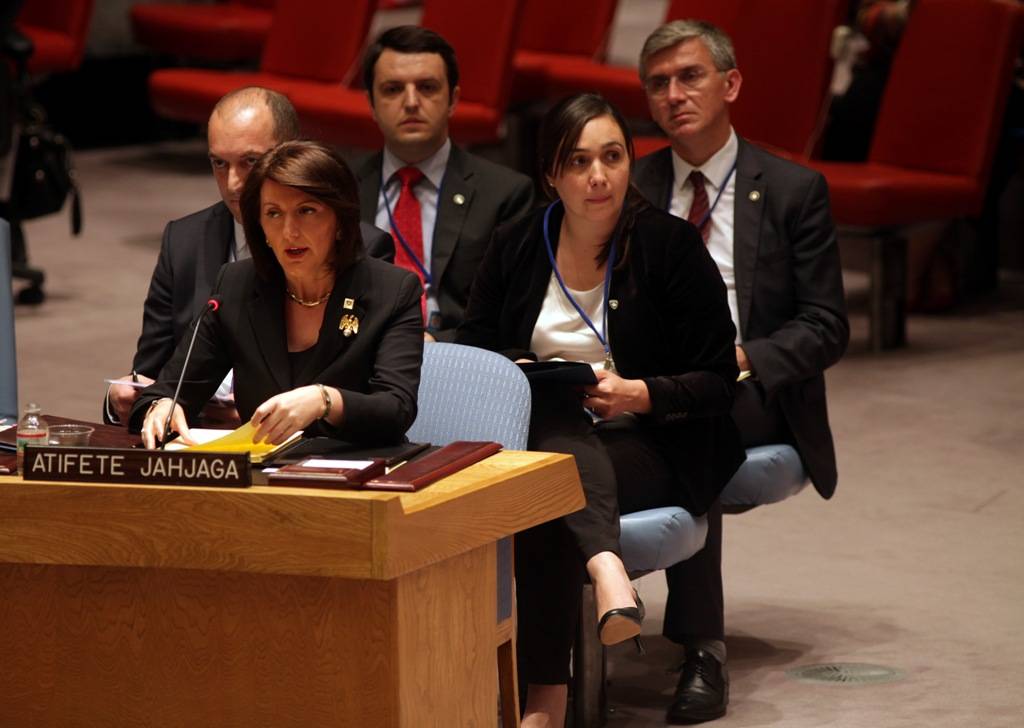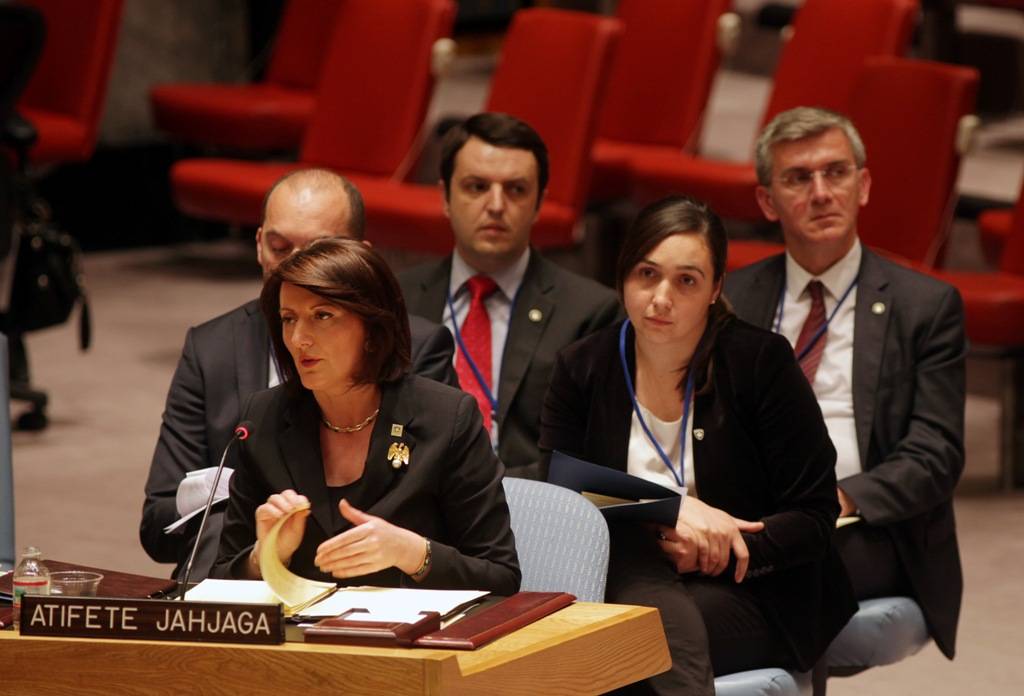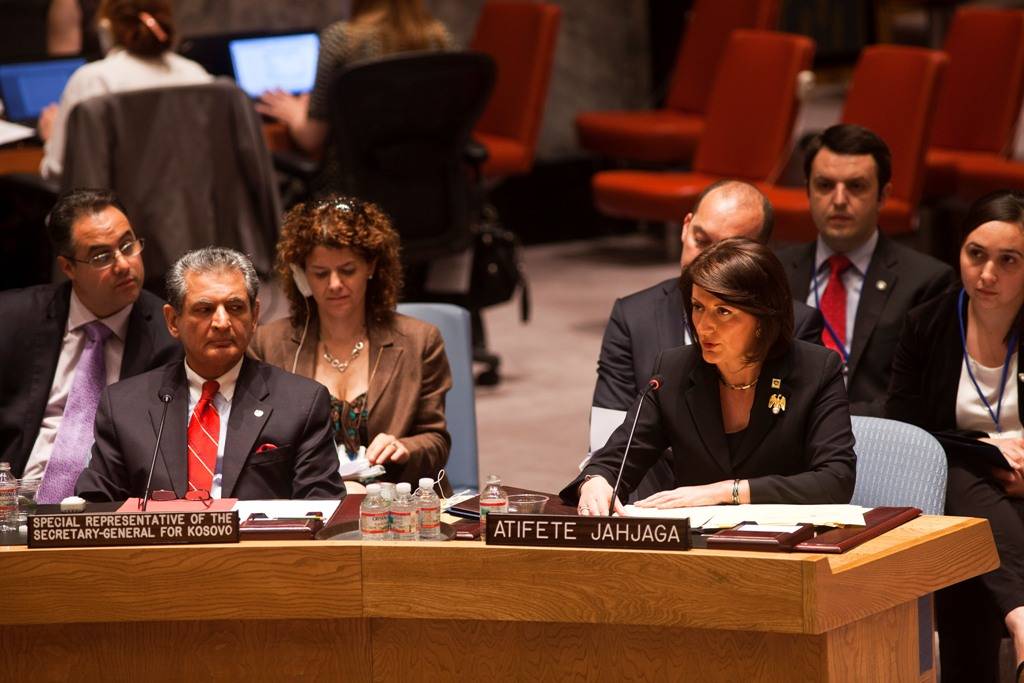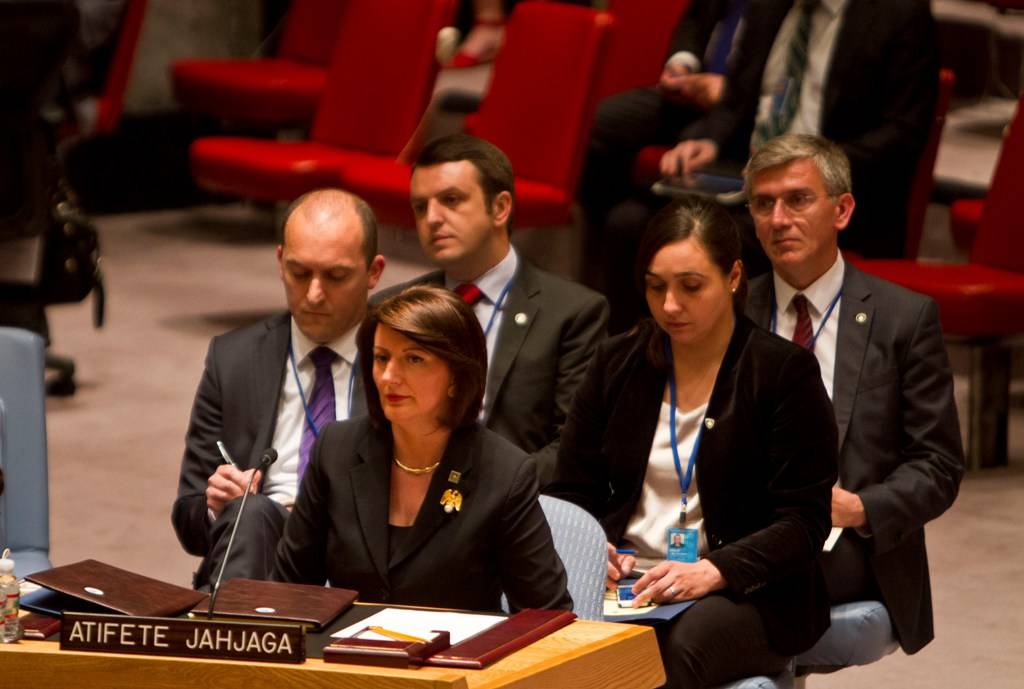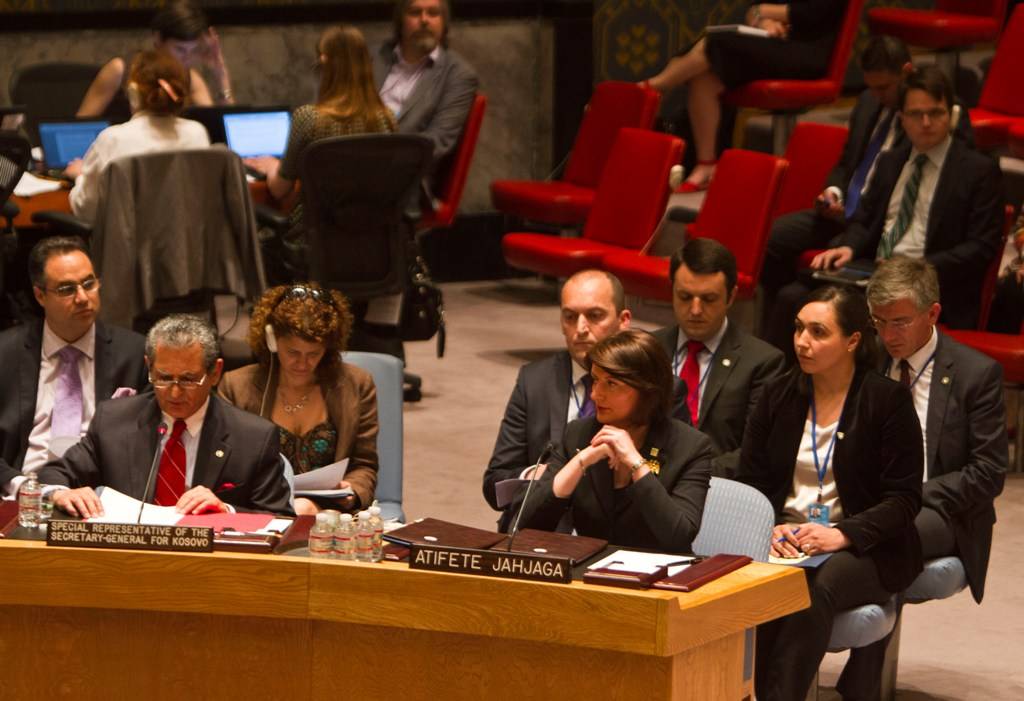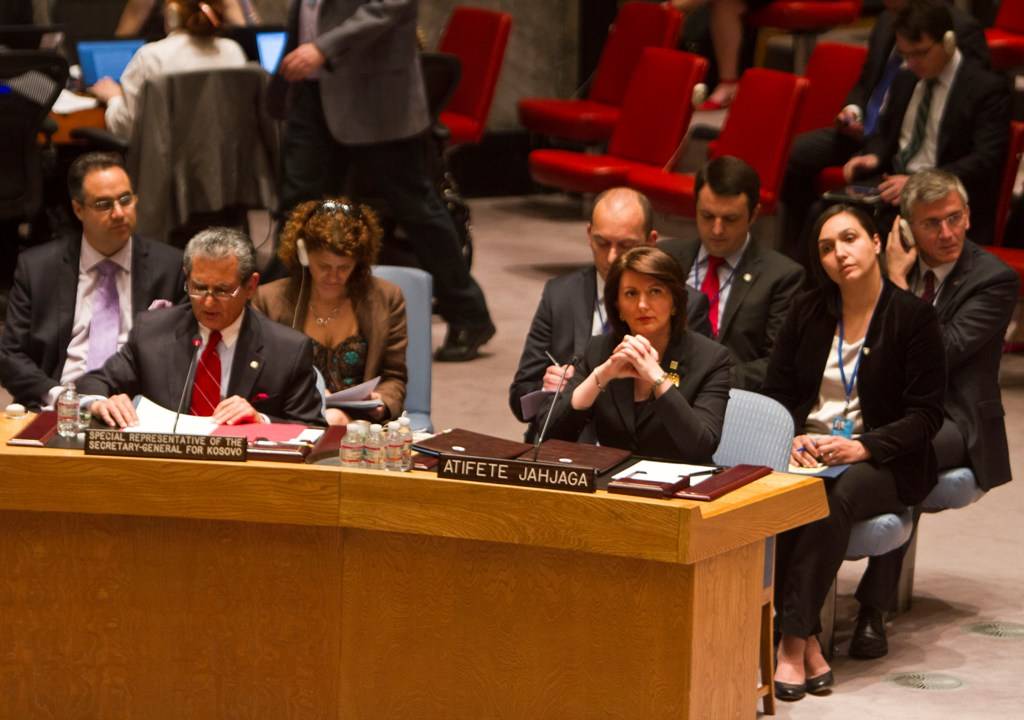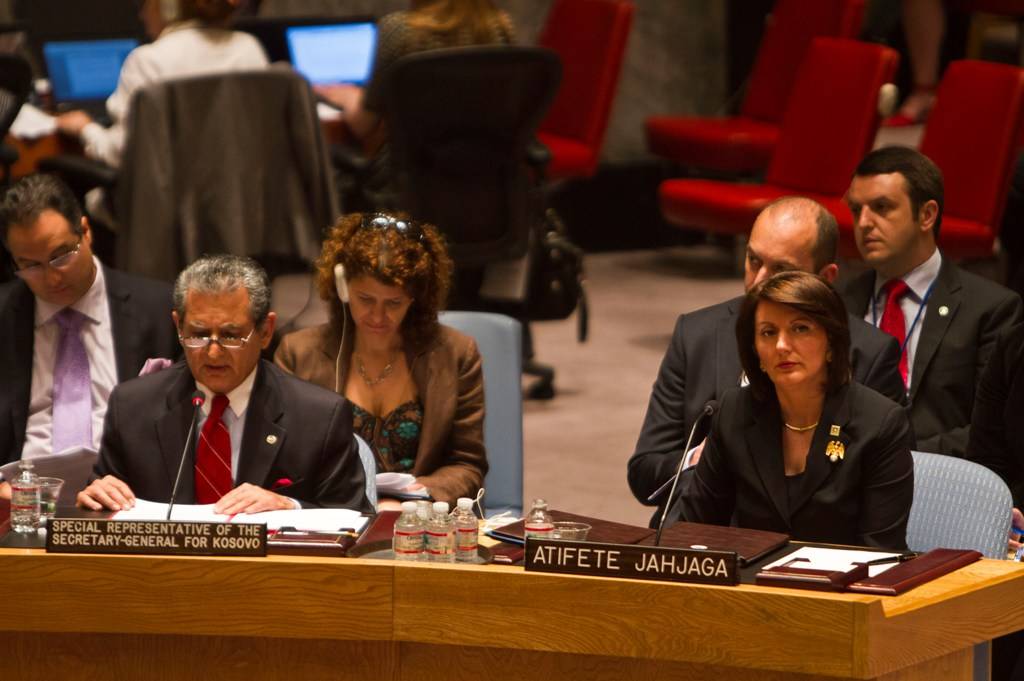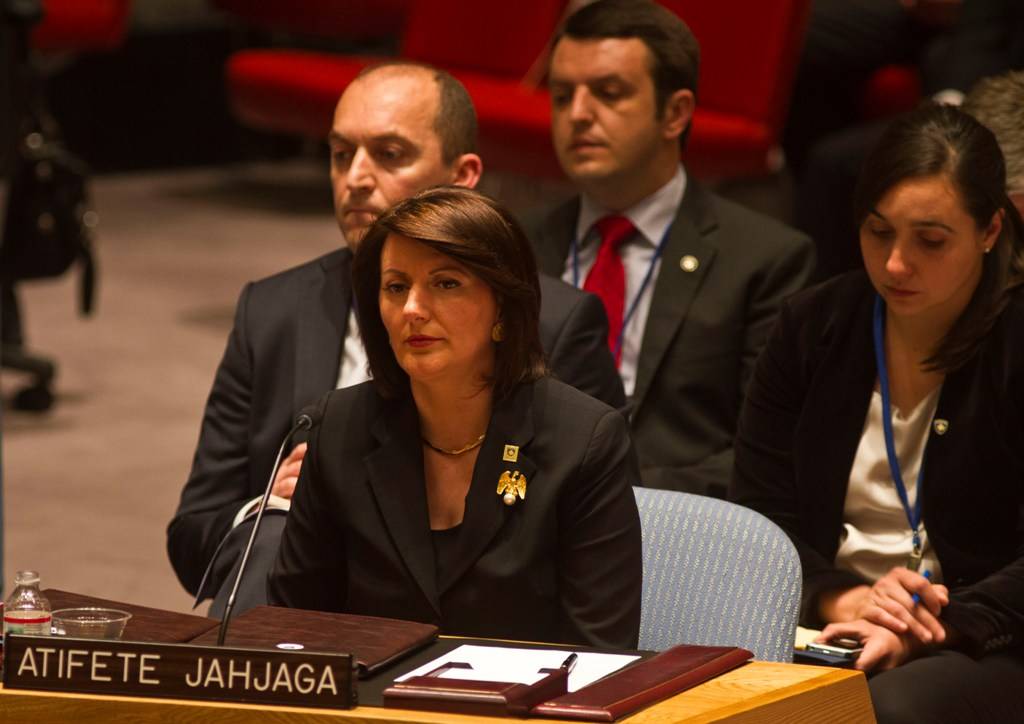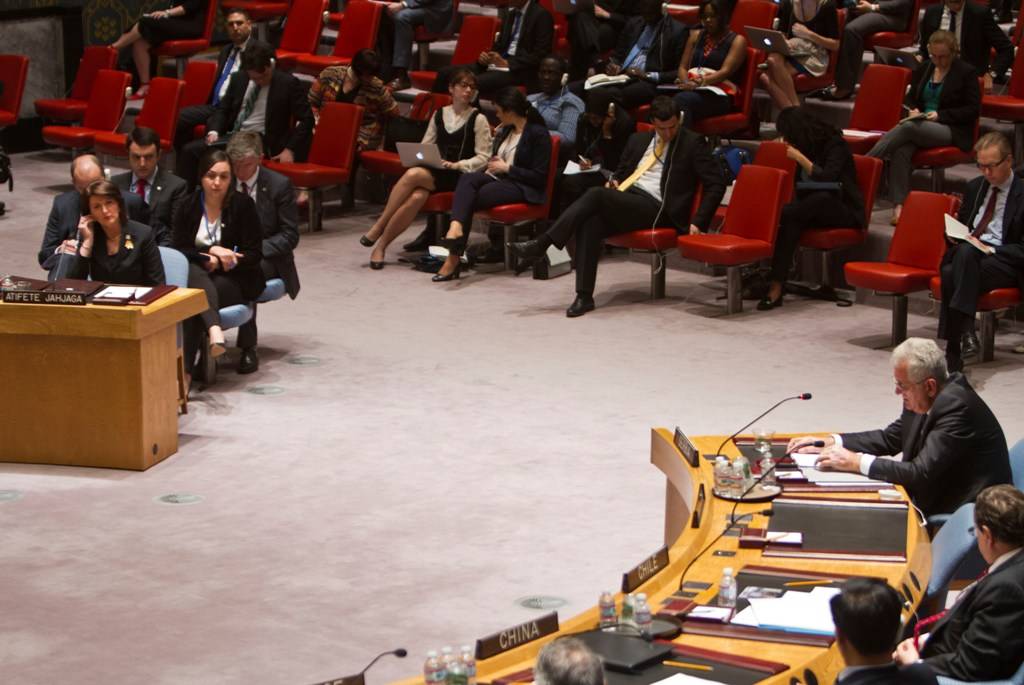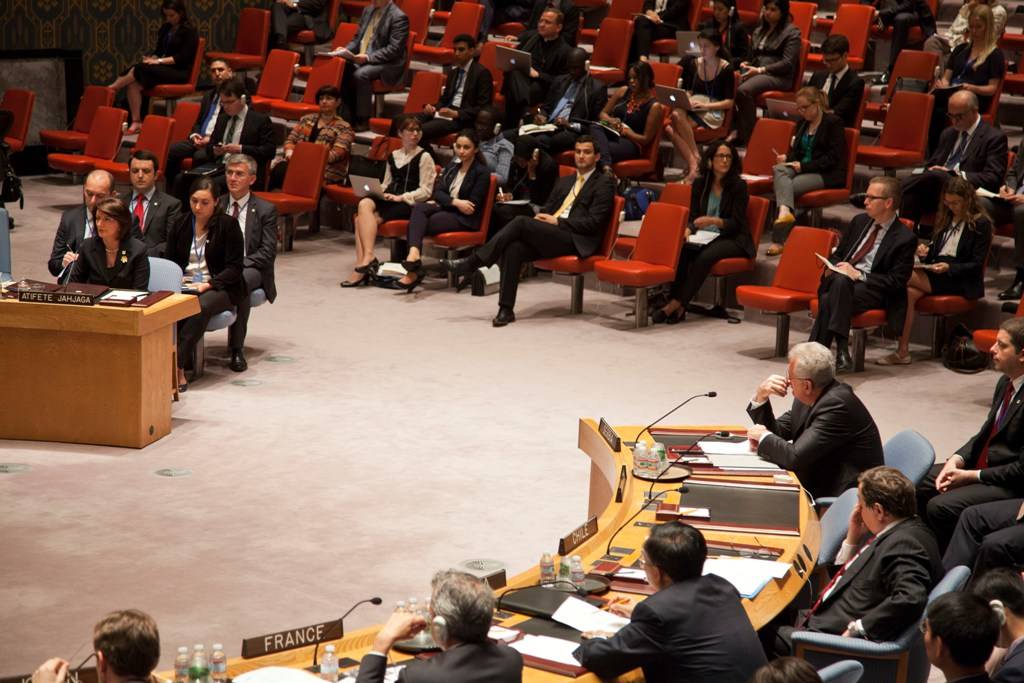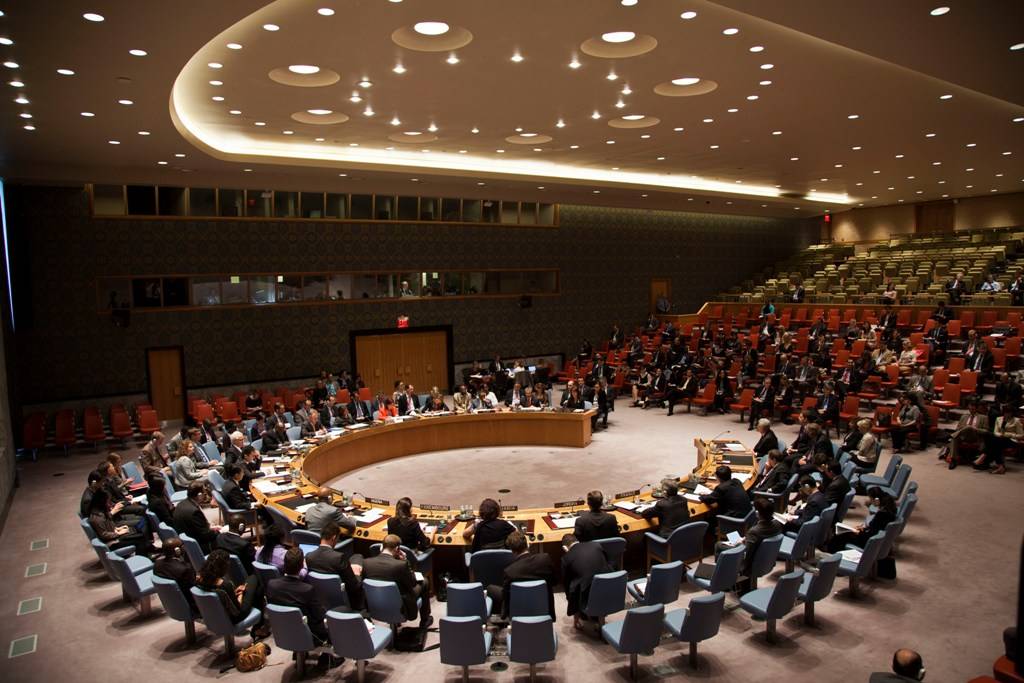Dear Mr. President,
Distinguished Members of the United Nations Security Council,
It is a distinct pleasure to be with you here today to share the developments in the Republic of Kosovo over the last three months, a period during which we have achieved much progress in consolidating our state, extending the rule of law in all the corners of our territory, and contributing to the peace and stability of the whole region of the Southeastern Europe.
On behalf of the institutions of Kosovo and its citizens I would like to express our appreciation to the United Nations Secretary General Ban Ki-Moon for his contribution to peace and stability in Kosovo and the region, and to the member countries of the UN Security Council for their interest and support to Kosovo’s and region’s overall progress.
I would also like to use this opportunity to express our sincere condolences to the President of Serbia and its citizens for the loss of lives and property as they battled terrible floods in the past few weeks. President Nikolic, our thoughts and prayers are with your citizens affected by this tragic natural disaster.
Honorable Members of the UN Security Council,
Over these past several months, the Republic of Kosovo has shown political maturity, courage and leadership, and we have reaped tangible results inching us closer to our overall goal of creating a multiethnic and multicultural state of equal citizens, living in peace and prosperity regardless of their ethnicity, gender, religious affiliation or race.
Beyond our daily efforts to reach out, protect and integrate all of Kosovo’s ethnic communities in the country’s institutional and social life, we have constructively engaged with the Republic of Serbia in a thorough dialogue to normalize the relations between our states and better the lives of our citizens.
Today, Kosovo is a very different place from the destroyed country we inherited fifteen years ago with thousands of civilian deaths, with many victims of torture and rape as a tool of war, physical destruction and a legacy of hostilities and ethnic cleansing conducted by the Serbian forces.
Recovery has not been easy. It took the generosity of the international community and will from our citizens to get to where we stand today. It also took political will and courage to move on.
I take note of the support that Serbia’s President, Mr. Tomislav Nikolic has given to the process of the dialogue between Kosovo and Serbia in the normalization of the relations between our countries. While we have our differences over Kosovo, it is important that we have recognized the reality of Kosovo’s independence and its irreversibility.
In conjunction with the political progress, we have focused much of our attention in further consolidating our sovereignty, extending and strengthening the rule of law, building a sound basis for economic development and attraction of the much-needed foreign investment, solidifying credible institutions and showing political will and maturity to press ahead and come closer in realizing our aspiration to join the European Union and other international bodies.
The Republic of Kosovo remains committed to the dialogue process with the Republic of Serbia.
In this process which began in 2011 and culminated in a comprehensive agreement on April 19, 2013, facilitated by the EU High Representative on Foreign Policy and Security, Baroness Catherine Ashton and supported by the international community, we have reached political and societal inclusion and consensus. We have gone beyond ideological boundaries and the daily political agendas. We are determined to move on and move forward.
This process of the dialogue with Serbia has been one of our major efforts and its implications reach far beyond the consolidation of Kosovo’s sovereignty and territorial integrity and its membership in international organizations.
Agreements reached in Brussels are facilitating the full integration of the Serbian community in Kosovo. They have ended the operation of the illegal security structures supported by Serbia in parts of Kosovo, bringing the much needed rule of law to the citizens of the northern part, who lived in an atmosphere of intimidation and lawlessness for too long.
These agreements will bring daily services closer to the citizens of the northern municipalities. They have enhanced their freedom of movement, as they have eased the movement of goods and increased the well-being of the citizens on both sides of the border through proper revenue collection. While much of the focus has been on the north, we see these developments as positive for our entire society and beneficial to citizens across the country.
Agreements negotiated and signed in Brussels have boosted the European perspectives for Kosovo and Serbia based on cooperation and good neighborly relations while setting them on distinctive paths to the European Union.
The success of the dialogue process has confirmed once again the transformational power that the European Union project holds, paving the way to this union _ and to us _ to advance the momentum of region’s integration in its midst.
In this vein, I encourage the remaining five EU member states to recognize Kosovo’s independence and further this perspective that remains crucial to peace and stability in the Western Balkans and beyond. I also use the opportunity to express our appreciation to over 100 countries around the world for recognizing Kosovo’s statehood and endorsing its vision for a democratic and multiethnic country. And I urge the remaining UN members that have yet to recognize Kosovo to do so.
Dear Mr. President,
Distinguished members of the Security Council,
As we marked the first anniversary of the bilateral normalization Agreement reached in Brussels through the EU-mediation last April between the Prime Ministers of both countries, Kosovo institutions have focused on the successful implementation of its fifteen points.
We are convinced that its full implementation in a consistent and effective manner will further transform our future relations and bring stability to the region. We thank our partners, the European Union, for its role as a facilitator and guarantor of the dialogue process and the United States, a strong supporter of this process, and we encourage them to continue to stand by us as we move forward.
Considerable progress has been achieved in the implementation of the agreements, and we expect it to gain momentum again once the electoral processes in both countries are completed.
In particular, I would like to again highlight the successful completion of the local elections organized throughout Kosovo, including their official inauguration and adoption of the municipal statues in accordance with the Kosovo law as called for in the Brussels Agreement. I am pleased to note that the participation of the Serbian community and other ethnic communities in Kosovo has been satisfactory.
With the completion of the statutes of the four northern municipalities, the Association of the Serb majority municipalities can be created in accordance with Kosovo’s Constitution, laws and the European Charter of Local Self Government to ensure the integration of the Serbian community in the country. The Association will be an integral part of the Kosovo institutions.
Similarly, good progress has been made on the customs revenue collection at the northern border crossings, as well as in the establishment of the Development Fund and its management board, the closure of the offices of Serbian Ministry of Interior operating in these municipalities and the integration of their personnel in Kosovo police force as stipulated in the Brussels Agreement. We look forward to concluding the agreement on dismantling of parallel courts at the next meeting in Brussels and we expect Serbia to meet its responsibilities in ceasing the work of these courts and paving the way to the integration of Kosovo Serb judges and prosecutors in Kosovo’s justice system.
More remains to be done in the area of security in the four northern municipalities, including the disbandment of the remaining parallel structures. In this period, I note with concern instances of resistance to the establishment of rule of law in the four northern municipalities by paramilitary and criminal groups who have kept hostage the progress of the Serbian community in Kosovo over the last fifteen years. These structures also continue to endanger the staff of domestic and international law enforcement agencies, as witnessed recently with the attack on EULEX vehicles, as well as in erecting barricades that continue to prevent the freedom of movement.
We expect from the new government in Serbia to keep its end of the agreement and continue to engage constructively to ensure that Kosovo Serbs accept and endorse the agreements reached in Brussels in our joint effort to bring stability and peace to our citizens, to the region and beyond.
As we approach the general early elections in Kosovo, I have called on all mechanisms and all the parties in Kosovo to ensure a stable environment, democratic and fair conditions, that would allow a free and inclusive vote.
I reiterate my call to all of Kosovo’s ethnic communities to exercise their constitutional right through their full participation in the elections to elect their representatives that will give voice to their interests and demands and to work jointly with us in strengthening democracy in Kosovo.
Kosovo’s institutions remain committed to the return of all the refugees and those displaced by the war. To make these returns sustainable we have taken a comprehensive approach by investing in housing sector, health and security, access to education as well as economic development.
I am particularly encouraged that some of the recent returns have taken place in the urban center as well as the cooperation with the regional countries to work with Kosovo’s government in facilitating these returns.
Dear Mr. President,
Distinguished members of the Security Council,
The Republic of Kosovo is committed to a comprehensive reform process that will enhance its future prospects for membership into the European Union, as the main agenda that unifies the citizens of Kosovo and the option that enjoys institutional and societal consensus.
Building on this tangible progress, I am pleased to inform you that earlier this month, Kosovo completed the negotiations on the Stabilization and Association Agreement with the European Union as the first key step in our path to future membership.
I look forward to its swift formalization of results following the general elections in Kosovo, as we work to ensure a safe and sound environment for our citizens and a better quality of life as we pursue this European perspective. We have reached significant progress in meeting the conditions to join the visa free regime with the EU and we expect this process to be concluded soon.
During this period we have also completed a thorough review process of our security sector. This process, which has domestic ownership for the first time and has been conducted in an organic and transparent manner, studied the current security mechanisms, and assesed the needs of our citizens and
Kosovo’s strategic goals.
As part of the recommendations stemming from this process, is the creation of the Kosovo Armed Forces, designed as a lightly armed defense force that we believe will meet the security challenges of Kosovo in the medium and long term and it will be our vehicle through which we contribute to region’s collective security.
The creation of the Kosovo Armed Forces is a decade-long and an inclusive process that seeks not only the support of all the ethnic communities but their active participation.
Both security organizations in Kosovo have a good record of inclusiveness – about 15% of Kosovo’s police force consists of officers from the ethnic communities and about 9% of the Kosovo Security Force are members of ethnic communities.
On the creation of Kosovo Armed Forces we have reached out to ethnic communities in Kosovo, the regional countries and our international stakeholders at NATO to explain the outcomes of the review process and we shall continue this important dialogue.
In our effort to become security providers, Kosovo’s institutions have and shall continue to act in partnership with the international community and specifically with NATO in this process.
In our clear commitment to European future for Kosovo, we have partnered with EU’s mission EULEX to strengthen the rule of law throughout the country. As we are translating this strong commitment against corruption and organized crime into concrete actions, I have asked the European Union for an extension of the EULEX mandate until 2016. While EULEX will transition from an executive mandate into a mentoring role, its continued contribution in strengthening the independence of our multiethnic justice system will be invaluable. In the new mandate, EULEX will complete the pending cases, and will take up new ones upon request from Kosovo’s institutions.
The new EULEX mandate, which was endorsed by Kosovo’s Parliament, will continue to assist in the implementation, where agreed, of the EU-facilitated Dialogue between Kosovo and Serbia.
In our efforts to stay true to the commitment to build a democratic Kosovo, at peace with itself and its neighbors and the values and ideals enshrined in our Constitution, Kosovo’s Parliament has endorsed the creation of the Special Court, with internal and external seats, to address war crime allegations stemming from a report by the Council of Europe in 2010.
The creation of the special court reflects Kosovo’s determination for an independent and impartial process to credibly address these allegations as we believe that a commitment to justice for all is the only way to true reconciliation in the region.
As we speak here today, working-level teams from Kosovo and Serbia are digging out a mass grave in the Serbian town of Rudnica, unearthing the remains of some of the one thousand, seven hundred and twelve missing from the Kosovo war. These are bodies of Kosovo Albanian civilians abducted and executed by Serbian forces during the war.
Closing this chapter goes beyond politics. As leaders of our countries, it is our obligation to help bring closure to thousands of shattered families by empowering the Commissions working on the issue of the missing to investigate their fates and showing political will and courage to bring to justice those that perpetrated these horrendous crimes.
Mr. President, Members of the Security Council,
We have worked intensively to turn a new chapter in Kosovo, where each and every citizen enjoys equality and lives in freedom and peace. A lot has been achieved and much remains to be accomplished.
I am encouraged by the change we have seen in the region and the endorsement that we have received from the international community, which stood by our side to offer clear and distinct perspectives to Kosovo and Serbia on their paths to the European Union.
Kosovo will stay committed to building good relations with its neighbors that promote cooperation and mutual trust – a paradigm shift for a region engulfed in war less than two decades ago.
In this path, we were guided by the deep conviction not to allow the repetition of the painful past and the immeasurable suffering inflicted upon the lives of Kosovo’s citizens. There will continue to be controversies and tensions as we move forward.
Yet, I believe that the progress achieved thus far should and will be maintained as we stand determined to secure a prosperous future to the young generations.
Mr. President, Distinguished members of the Security Council,
We want to continue to cement the gains we made in strengthening Kosovo internally and consolidating it internationally, as the two processes are tightly linked.
As we move forward, we seek your help and guidance as the success in Kosovo and the advancement of this momentum will be our joint legacy, just as today’s Kosovo, in peace and prosperity, is our joint success.
Thank You for your attention and your support to the progress in Kosovo.

